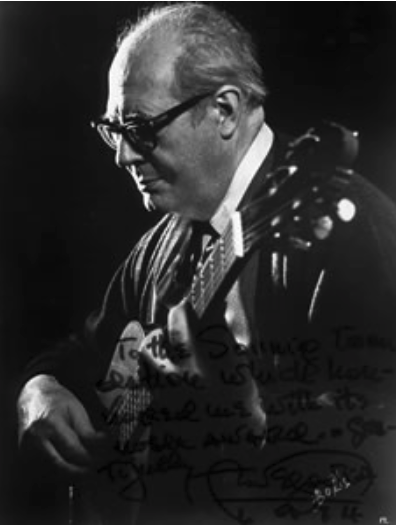léonie sonning music prize 1974
The Spanish guitarist Andrés Segovia received the Léonie Sonning Music Prize of 65,000 Danish kroner at a concert on 30 May 1975 at the Falconer Centre. The second half of the concert was broadcast on the Danish Broadcasting Corporation’s P2 radio channel.
citation
The prize was presented by Børge Friis, the Léonie Sonning Music Foundation’s chairman.
The Léonie Sonning Music Prize of 65,000 Danish kroner is hereby awarded to Andrés Segovia in recognition of his lifelong and restless efforts to preserve and renew the Spanish guitar tradition and to give it an honorable place in the concert halls of the world, reviving a valuable musical heritage and encouraging the performance of new works. Segovia’s work has inspired the young. Here in Denmark and in the rest of the world, it stands as an expression of the highest ideals of the art of music.’
The programme
Luis Milán Three Pavanes
Luis de Narváez La Canción del Emperador; Diferencias
Robert de Visée Suite i d-mol
J.S. Bach Sarabande og Gavotte
Fernando Sor Introduction & Allegro, op. 14
Mario Castelnuovo-Tedesco Capriccio; Melancolia; Tarantella
Federico Moreno Torroba Allegretto grazioso
Joaquín Turina Fantasía
Isaac Albéniz Torre Bermeja
Andrés Segovia, guitar
Segovia and Denmark
As far back as 1927, Andrés Segovia gave his first concerts in Denmark, at the Odd Fellow Palace in Copenhagen. Back then he was announced as ‘the world-famous Spanish guitarist.’ The press reported that Segovia’s ‘unique success manifested itself through ecstatic applause and a series of encores.’ The year before, in 1926, Carl Nielsen had attended a Segovia concert in Paris and reportedly considered composing a guitar concerto for him. But it came to nothing.
In the following decades, Segovia often came to Copenhagen to give concerts, both as a soloist and with orchestra, as in 1962 when he was the soloist in Boccherini’s Guitar Concerto in E major with the Danish National Symphony Orchestra. Segovia’s influence on the guitar’s status and repertoire was immeasurable, including in Denmark. The leading Danish guitarist of the time, Ingolf Nielsen, stated to Politiken on the occasion of the award ceremony: ‘he has touched a lot of people, that is obvious. Because he has created what you could almost describe as worldwide buzz. You have to admire his ability to create a legend about himself while still alive.’
Immediately before the prize concert in 1974, Segovia announced that he would donate his fee from the concert back to the foundation. Many years later, as the Segovia Prize, it was given to the Scandinavian Guitar Duo consisting of Jesper Sivebæk and Per Pålsson. Andrés Segovia last performed in Denmark at the age of 92, when he played a solo recital at the Odd Fellow Palace in Copenhagen – the same place he had performed for a Danish audience for the first time 57 years previously.
The daily press wrote, among other things:
Four centuries of music, interpreted and expressed by a master, so that young people of today listen with fascination. With his classical guitar, Andrés Segovia has spun threads between young and old, past and present, and never compromised – always keeping his ideals high. A full Falconer Centre applauded the old champion between his five encores. A musical evening characterized by clarity and strength. A young flowering cherry tree in full bloom.
(Claus Seidel, Land og Folk, 1 June 1974)
Segovia has been a guest of this country for half a century, but until half a dozen years ago, only a small circle faithfully showed up when he gave a concert. Now the guitar has become the youth’s favourite instrument the tables have turned, and now even the Falconer Centre is too small to accommodate his fans. As an artist, he is superb, his playing offering a world of beauty, nuance and resilient phrasing.
(Nils Schørring, Berlingske Tidende, 31 May 1974)
There are plenty of concertos for guitar and orchestra and also for guitar and string quartet these days, and we have first and foremost Segovia to thank for that as well as for instilling classical guitar teaching at most conservatories. Today, Segovia has come so far in his crusade against the dead-end aesthetic that confines guitars to bars and farmyard idylls, that his work has moved from being a personal matter to a “movement” that will not die out the day the master himself gives up.
(Torben Thune, Fyens Stiftstidende, 31 May 1974)





